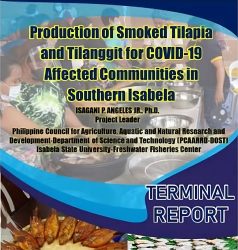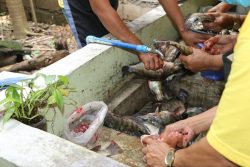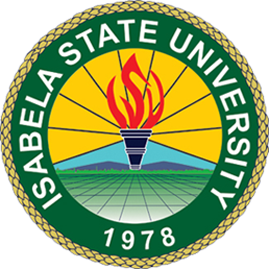 Feature Research | Isabela State University’s research thru its Cagayan Valley Freshwater Fisheries Center is leading a regional network of research collaboration with local governments and the Department of Science and Technology-Region 2 to innovate practices of the fisheries sector. The Project is entitled Production of Smoked Tilapia and Tilanggit for COVID-19 Affected Communities in Southern Isabela which aims to (1) provide nutritious and cheaper food for affected communities in Southern Isabela (Santiago City, Echague, Ramon), (2) conduct training/workshop for 175 beneficiaries on the processing of tilapia, and (3) help selected beneficiaries to generate an additional source of income for communities affected by the COVID- 19 pandemic.
Feature Research | Isabela State University’s research thru its Cagayan Valley Freshwater Fisheries Center is leading a regional network of research collaboration with local governments and the Department of Science and Technology-Region 2 to innovate practices of the fisheries sector. The Project is entitled Production of Smoked Tilapia and Tilanggit for COVID-19 Affected Communities in Southern Isabela which aims to (1) provide nutritious and cheaper food for affected communities in Southern Isabela (Santiago City, Echague, Ramon), (2) conduct training/workshop for 175 beneficiaries on the processing of tilapia, and (3) help selected beneficiaries to generate an additional source of income for communities affected by the COVID- 19 pandemic.
Coronavirus Disease (COVID-19) is a pandemic disease that the Philippines is now dealing with. This is an infectious disease brought on by a recently identified coronavirus. Most people infected with the COVID-19 virus will experience mild to moderate respiratory illness and recover without requiring special treatment. More sensitive to COVID-19 are the elderly and individuals with underlying health problems such as cancer, diabetes, cardiovascular disease, or chronic respiratory diseases.
The best way to prevent and slow down transmission is to be well-informed about the COVID-19 virus, the disease it causes, and how it spreads. However, there are many ongoing clinical trials are evaluating potential treatments. Most infected people will develop mild to moderate illness and recover without hospitalization.
To combat the 2019 COVID-19 pandemic, Cagayan Valley Region II stepped up its efforts. In October 18, 2020, 551 active cases and 67 new cases of confirmed cases have been reported by the Provincial Health of Isabela, which has a total of 2,443 people under observation (accessed on IsabelaCOVIDUpdates/; October 18, 2020). However, the Philippines is fortunate in that its population can always rely on abundant fisheries and aquatic resources for food. Fish plays a crucial role in the diet as a cheap source of animal protein and significantly contributes to food security, especially in coastal populations and Pacific Island countries (Guevara and Camu, 1984). Fish is quite perishable due to its high moisture content (Ames et al., 1991).
The development of the fish processing industry is crucial for achieving fish self-sufficiency. Highly perishable fish is preserved and given a longer shelf life through fish processing. The Philippine Fish Processing Industry began with traditional methods and expanded to embrace modern fish processing. The only traditional fish methods of processing are drying, smoking, and salting. Non-traditional techniques include canning and freezing (Kjallstrand and Petersson, 2001).
Majority of fish that are sold dry include very little cholesterol or salt but a lot of vitamins and minerals that are necessary for the development of the body. Dried fish contains little to no saturated fat, which protects the heart and prevents issues with high blood pressure. Most individuals may consider these to be nutritious foods that should be incorporated into the diets to prevent obesity, diabetes, and other chronic diseases (Siddhnath et al., 2020).
The dried form of Nile tiapia has a high nutritional value and is an excellent source of calories, proteins, and minerals (Waterman, 2000). The dried fish indicated that contains a minimal amount of heavy metals and is a useful food source for maintaining human health (Mohamed, 2013). The primary objective of processing and preserving fish is to deliver it to a final consumer in a healthy, usable condition. The steps required to achieve this start before the fishing expedition and don’t end until the fish is consumed or processed into oil, meal, or feed (Karube et al., 2001). Paying attention to small details throughout the entire preparation, catching, landing, handling, storage, and transport processes is the key to providing a high-quality product.

Several countries are implementing unprecedented lockdown measures to limit the COVID-19 pandemic’s impact on public health as it spreads throughout the world. Unfortunately, these measures are having a big impact on other domains of human activity, such as food security, nutrition, employment, quality of life, and potential social unrest.
The technology to be used for smoked tilapia and tilanggit production were from DA-BFAR and Central Luzon State University (CLSU) with some modifications, respectively. The smoked tilapia will be flavored with lemon grass while tilanggit will be flavored with lime leaves.
This project aims to provide nutritious and cheaper food for affected communities in Southern Isabela (Santiago City, Echague, Ramon), conduct training/workshop for 175 beneficiaries on the processing of tilapia in affected communities in Southern Isabela (Santiago City, Echague, Ramon), and help selected beneficiaries to generate an additional source of income for communities affected by the COVID- 19 pandemic.
Access full text of the Terminal Report of the Research Project: click here, Production of Smoked Tilapia and Tilanggit for COVID-19 Affected Communities in Southern Isabela




